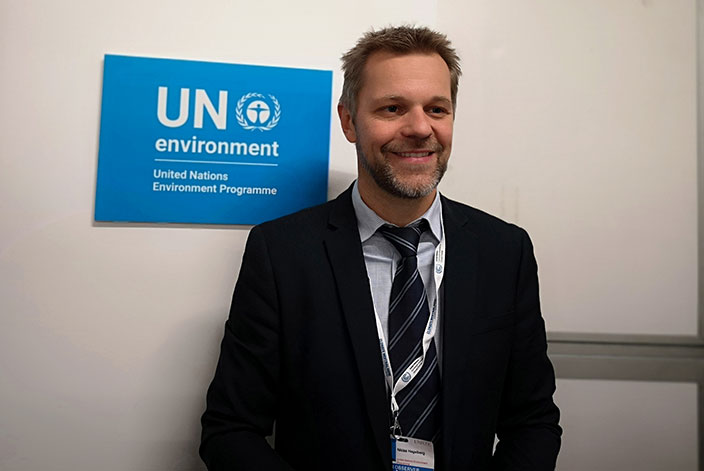Directing funding to green sector is needed, says expert


Governments across the world need to implement more preferential policies to direct investment from the private sector into climate-resilient development to provide the funding needed to curb global warming, said a senior official from the United Nations Environment Programme.
Niklas Hagelberg, coordinator of UNEP's climate change subprogram, said that how developing countries will be supported financially to address their challenges will be one of the most discussed topics in negotiations at a UN conference on climate change taking place in Katowice, Poland, until Dec 14.
Developed countries pledged in Copenhagen in 2009 to support a $30 billion "Fast Start" fund from 2010 to 2012, and scale up the aid to $100 billion a year by 2020.
"You'll hear later over these two weeks that there are differences in opinions on where the money comes from," Hagelberg said.
There is a view among developing countries that the financial support should come from the public funds of developed countries. However, he said, many developed countries think more of the money should come from the private sector.
Considering the current political situation, it will not be easy to redirect taxes collected in developed countries to developing countries.
"So I think that it's going to be important to unlock private sector finance and unlock it to the extent that we're talking about trillions of dollars in investment rather than $100 billion," he said.
A lot of money is still being invested in the "old economy", such as coal and the internal combustion engine, rather than the "green economy", including geothermal and solar energies and electric vehicles, Hagelberg said, adding that if the green economy becomes the normal economy, "then suddenly there will be a lot of money available".
"In many countries, the investment in climate in general is not easy," he said. "It needs to be made easier."
Governments need to draft policies that can give long-term certainty and direction for the private investor-for example, making it compulsory for companies to buy renewable energy at a fixed price.
Hagelberg said governments should draft policies under the principles of transparency, longevity and credibility.
"They need to be transparent so that everybody has a fair understanding of them, and that the rules are the same for everybody," he said.
Hagelberg said China is at the center of the negotiations in Katowice, as the country accounts for more than 20 percent of global emissions.
"The progress that China can advance will help the whole of the negotiations move forward," he said.
Despite high emissions in China, there has been progress: About 2.2 percent of cars currently sold in the country are electric ones. This accounts for half of total world sales, Hagelberg said, adding that China has also been a major market player in renewable energy development.
"I would say China, in many things, is at the forefront of that change," he said.
- Legal tools essential for AI regulation
- China launches remote-sensing satellite for Algeria
- China reports drop in workplace accidents, fatalities in 2025
- From Kansas to karst: Unpacking Guangxi's charms
- China carries out nearly 8.5m hectares of land greening in 2025
- Chongqing red leaf festival draws record 4.7 million visitors




































